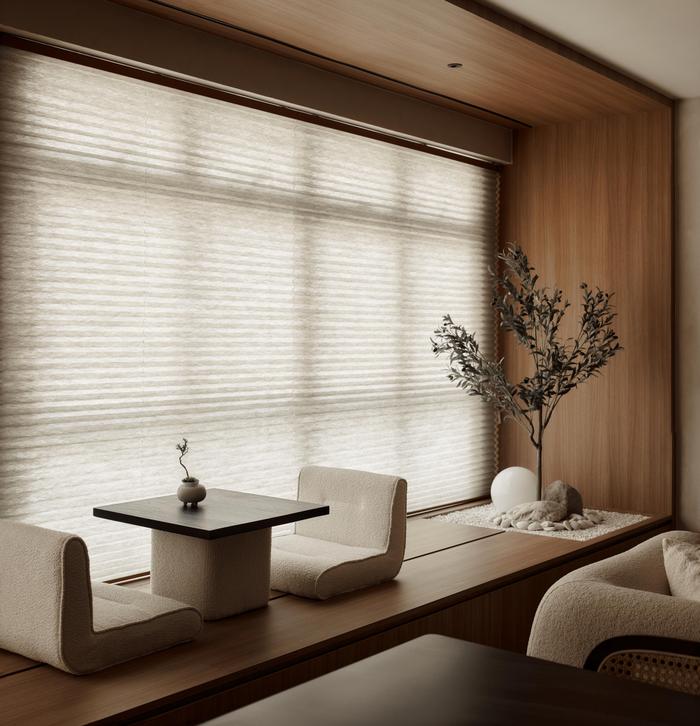Team curtains or blinds?
One of the most underrated areas in a renovation, the windows are something homeowners don’t think too much about. But you should – because aside from just being decoration, window coverings are essential to keeping pesky sunlight, sounds and (eyes) from invading your home.

For most, it boils down to these two: curtains or blinds. But which is best for your home? Fret not; based on your decor style, budget and needs, our quick guide below will help you decide once and for all: should you choose curtains or blinds?
1. Interior Style

View this project by Third Paragraph
Deciding between curtains and blinds depends on the mood/interior style you're going for. Curtains by default come in a variety of designs, thicknesses, patterns, and colours, which means they’re suitable for a wider range of styles.
Types of curtains you may have heard of include:
- Blackout curtains are made with a heavy fabric that completely blocks out sunlight and fabric
- Day and night curtains are a set of two curtains, where one is made of a lighter, translucent fabric and the other made of a denser, heavier material.
- Ripple fold curtains (or S fold curtains) feature evenly-spaced, continuous folds that create a sleek, uniform appearance

View this project by Darwin Interior
For instance, light, sheer curtains are great for exuding a light, airy mood in a minimalist or Scandinavian interior. Meanwhile, heavier, richer curtain fabrics in materials like velvet are a better fit for luxurious, contemporary styles.

View this project by Juz Interior
However, blinds are increasingly common now. More homes in Singapore are incorporating them in a variety of styles for its clean-cut looks which help imbue a sense of structure to the space. Pure white blinds exude a sort of classic colonial beauty, whilst wooden Venetian blinds are great for imbuing a rustic, natural touch into a home.
Popular types of blinds are as follows:
- Roller blinds are made with a single sheet of fabric that can be rolled up and down using a pulley cord or motorised system.
- Venetian blinds have horizontal slats that can be tilted to adjust the amount of light streaming into the room.
- Roman blinds are a fabric-based window treatment that can be rolled up into horizontal pleats.
- Korean blinds are a unique type of blinds made with alternating layers of opaque and mesh fabrics.
Our Verdict: Depends on the aesthetic you’re going for

View this project by The Local INN.terior 新家室
If you like the bright and airy look, curtains are your best bet. However, blinds may be more up your alley if you prefer the streamlined, clean-cut look.
Also, we’d recommend you to go with blinds if you don’t have a full-height window, as the elongation effect that curtains usually have will be negated with a shorter window. Read the article below for more information:
2. Cost Effectiveness

View this project by Taccuino Interior Studio
If cost is more of an issue, here's a rule of thumb – curtains, in general, are always cheaper than blinds. Why? It's all in its form; in general, soft fabrics are always cheaper than harder blinds made of wood or plastic.
Also, more work is needed to construct a blind, which may account for the raised prices. Of course, prices may differ based on the type of textures or materials; a velvet/suede curtain can still be costlier than wooden blinds.

View this project by Between Walls
Other cost-saving ways are to use substitutes. Instead of natural silk, you can go for faux silk curtains to get that high-end, European style. Alternatively, ready-made curtains that can be bought off the shelf are much more affordable, but they risk becoming ill-fitting on your windows.

View this project by T&T Design Artisan
In terms of blinds, materials like vinyl tend to be more affordable than aluminum, wood or textured blinds.
Our Verdict: Curtains
Cost-wise, curtains, in general, are usually much more affordable – but of course, that depends on the type of material you're going for.
3. Maintenance

View this project by Mr Shopper Studio
Curtains and blinds require maintenance in different ways. For curtains, this involves a wash every so often to remove dust and restore its lustre.
This, by itself, is not very time-consuming as you can simply just toss them into the washing machine or send them for dry cleaning, but note that removing/hanging them on the rail still requires a fair bit of effort.

View this project by Forefront Interior
Conversely, blinds don’t need to be taken off the rail to be cleaned – however, for Roman or Venetian blinds, you do need to clean each slat manually as they accumulate dust easily.
But, roller blinds are more convenient to maintain with less demanding cleaning regimes – spot clean, dry clean or hand-wash.
In terms of durability however, blinds may be a hardier choice. Curtains, like all fabrics, may fade over time, due to sunlight exposure and frequent washing.
Our Verdict: it depends on your cleaning preferences

View this project by Mr Designer Studio
If you'd like to save the trouble for manual cleaning, fabric curtains are definitely easier to maintain. However, if you want to save yourself the trouble of removing your curtains from the rail every so often, blinds are the way to go.
Durability wise, blinds are more long-lasting, as curtain fabrics may be susceptible to fading.
4. Light Control

View this project by ECasa Studio
Let's not forget the main point about having a window covering: blocking out light. Once again, curtains come up tops in terms of light coverage, especially thick, blackout curtains made of heavier materials like brocade or suede.
While curtains may be great at keeping light at bay, they, unfortunately, don't do much for controlling the amount of light filtering through.

View this project by Intheory Design
Blinds provide more of that control; wind up for total sunlight, or adjust the slats accordingly to let your desired amount of sunlight in.
Our Verdict: It depends on what you're after
It depends on your preferences. For light coverage, go for curtains. For light control, go for blinds.
5. Sound Control

View this project by Third Paragraph
In terms of sound control, curtains are also better than blinds. Gaps in between the blinds, unfortunately, allow sound to pass through easily. Not only that, on windy days (or when your fan is on), blinds hitting the windowsills can make a racket as well.

View this project by Space Atelier
Heavyweight curtains are the most ideal for blocking noise, especially if your home faces the road or corridor. Thicker, denser fabrics help to prevent noise from penetrating through the room.
Our Verdict: Curtains

View this project by Fifth Avenue Interior
The higher density and flexibility of softer curtains help to dampen sound waves passing through. Also, blinds may be at a disadvantage, as they can make quite a racket on windy days.
Looking for curtains and blinds for your home?
Check out our recommendations in the article below:
Alternatively, visit our brand directory to view our curated list of home and living brands (and maybe even snag an exclusive deal while you’re at it).

 Get a budget estimate before meeting IDs
Get a budget estimate before meeting IDs